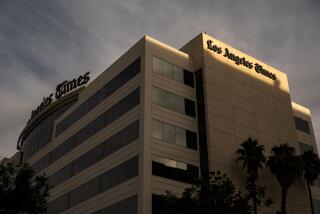Is the Zell plan a real deal for Times readers?
THERE’S a certain metaphoric resonance in the fact that investor Sam Zell struck his final bargain with Tribune Co.’s directors in the middle of the night.
When it comes to the journalism the Los Angeles Times and the company’s other newspapers offer their readers, this whole arrangement is pretty much a shot in the dark.
For the record:
12:00 a.m. April 4, 2007 For The Record
Los Angeles Times Wednesday April 04, 2007 Home Edition Main News Part A Page 2 National Desk 0 inches; 30 words Type of Material: Correction
Times sale: The Regarding Media column in Tuesday’s Calendar section said the L.A. Times had been sold twice in five years. The paper has been sold twice in seven years.
If the deal goes through as structured, the Chicago-based real estate entrepreneur throws in a few hundred million of his own billions and the company antes up all the money it would have paid into the employees’ 401(k)s, forming a new, Zell-controlled partnership that buys up all the existing stock and turns Tribune into a privately held company.
Monday, some analysts were a bit puzzled over where the deal is in this deal?
The Wall Street Journal’s Dennis Berman characterized Tribune’s announcement Monday as an admission “that it couldn’t really find a buyer, and that it is essentially buying itself, with Sam Zell throwing in some spare change.”
Laura Martin of Soleil Securities told MarketWatch that the arrangement “smacks more of financial engineering than true value creation.”
Apparently, Zell’s leadership is the value being added in this arrangement. He, however, has said he has no editorial aspirations, that he regards this acquisition as a purely financial opportunity and will leave the current management in place.
Tribune Chief Executive Dennis J. FitzSimons said Monday that, “operating outside the glare of the public markets, we will be better able to focus on long-term growth as we transform our publishing and broadcasting businesses.”
That’s certainly possible. Free of Wall Street’s quarterly demands, the new private company can theoretically divert its substantial cash flow into maintaining service to readers and viewers while reinvesting in the technology that will create the new print-online-broadcast hybrids that surely are American journalism’s future vehicles.
Theoretically is the operative word here.
The new, private Tribune will have swapped the demands of stockholders for roughly $12 billion in debt to make this deal happen. Will those creditors be more forgiving than the capital markets? Maybe, so long as Zell and the other equity partners, whoever they may be, are willing to forgo potential revenue from this arrangement for the sake of reinvestment and the maintenance of quality journalism.
Otherwise, the new company basically is in the position of a college student who has achieved financial independence from Mom and Dad by maxing out a Visa card.
How will readers of the Los Angeles Times be able to tell the difference?
Actually, that’s easy and it’s very much the point. Over the last five years, this paper’s readers have received less and less in the way of news and features provided by fewer and fewer journalists.
Tribune has installed one publisher after another who has said that it is impossible for The Times -- or any other newspaper -- to cut its way to success. This has become truer, as it has become more apparent that the simultaneous provision of high quality journalism in print and online is the way forward for newspaper journalism.
And yet the cuts have continued. When the cuts stop and readers are no longer asked to expect and to accept less from their newspaper they’ll know the tide has turned.
If and when Zell’s purchase of Tribune is consummated it will accomplish one thing for certain: After more than 120 years, the Chandler family will be out of the newspaper business.
Good riddance.
Southern California and this newspaper’s role in its development made the Chandlers rich beyond any normal human being’s wildest dreams. All the heavy lifting, of course, was done by their rapacious forbearers and, later, by Otis Chandler, who broke with the rest of his venal clan to make The Times a great newspaper.
The current beneficiaries of all that brutal avarice and ingenuity are wealthy through no effort of their own. They’re like a bunch of Saudi princelings, whose grandfather’s wretched tent just happened to be pitched atop an oil field. Their blood is a kind of genetic lottery ticket.
You’d think that sort of great fortune would have engendered some sense of gratitude -- perhaps even a vague stirring of unfamiliar emotions, like ... say ... responsibility toward the city and region upon which their family has fattened for so long. Some of that sense of grateful obligation might even have included a small inclination to make sure that The Times continues to make itself of service to this community.
The truth of the matter is, however, that -- except for Otis -- the Chandlers never have conceived of this newspaper as anything much more than agent or -- in recent years -- adjunct of their own financial interests.
One does not speak of emotions like gratitude or loyalty when discussing the Chandlers, any more than one would ascribe those qualities to wolves. It simply is part of their nature to acquire and consume. They eat because that’s what they do.
The people who run Tribune have learned that to their sorrow.
The process that led to the company’s sale to Zell began with demands by the Chandler family trusts, which own 20% of Tribune, for more money. They acquired their foothold in Chicago by selling this paper and the rest of the Times Mirror Co. to Tribune for $8 billion, nearly as much as now is being proposed to take the company private. The Chandlers’ share of this latest deal will come to about $1.6 billion.
Talk about clasping an asp to your bosom.
In other words, this newspaper now has been sold twice in five years, to accomplish the impossible -- satiating the Chandlers’ greed.
Take it from somebody who spent a lot of years working for them: If these people thought there was another nickel to be made off the Los Angeles Times by selling it to the North Koreans, Kim Jong Il would be running this newspaper’s editorial policy the next day.
The Los Angeles Times’ readers deserve better than that.
*
More to Read
Inside the business of entertainment
The Wide Shot brings you news, analysis and insights on everything from streaming wars to production — and what it all means for the future.
You may occasionally receive promotional content from the Los Angeles Times.










